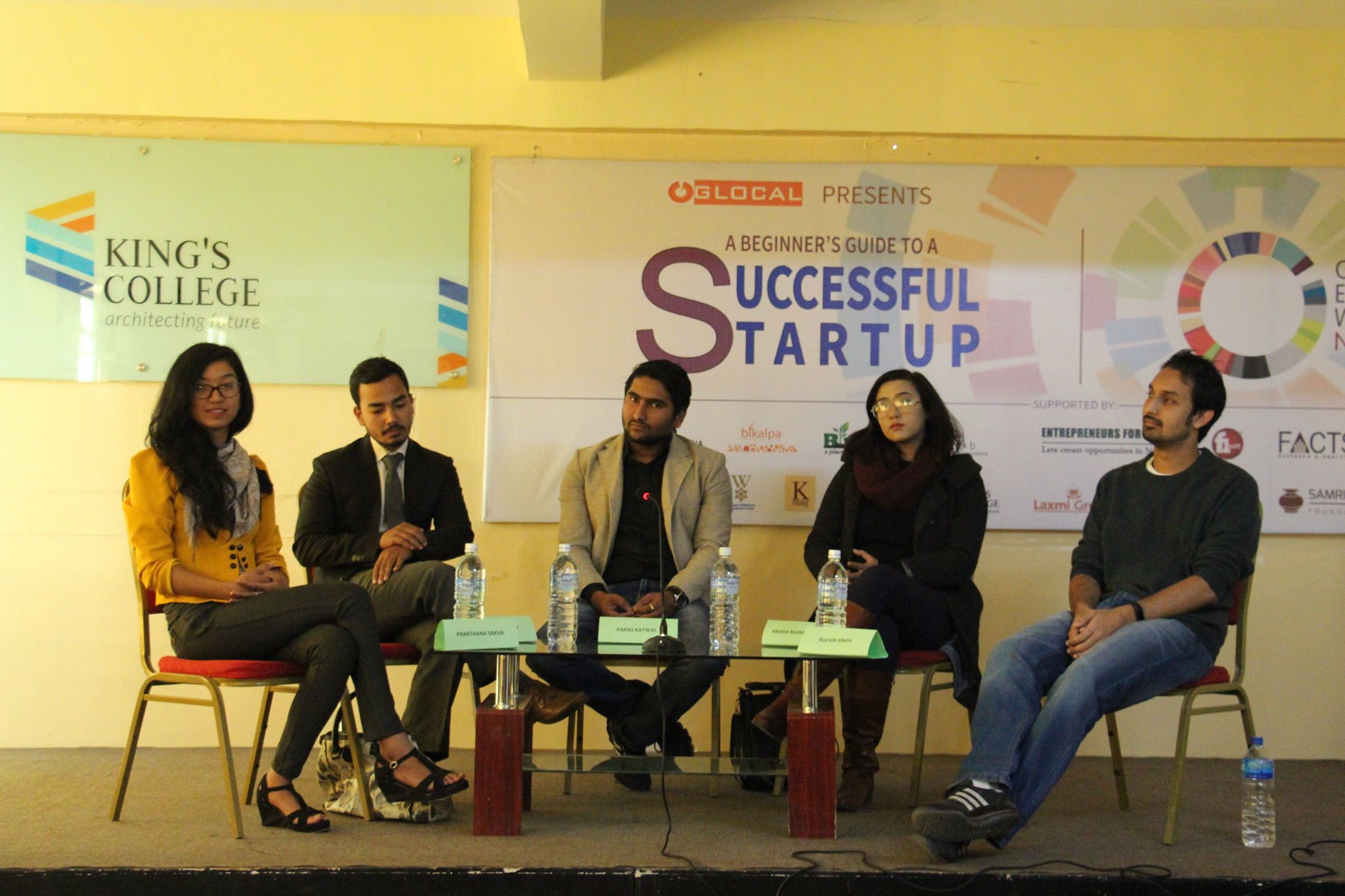Five Nepali young entrepreneurs share success story of their businesses and how they were able to reach the position they are now.
Kathmandu, November 19, 2016: To celebrate Global Entrepreneurship Week in Nepal, Glocal Pvt. Ltd. today organized a panel discussion programme with 5 successful startup founders in Nepal. Prarthana Saakha, Co-founder/Managing Director, Helmets Nepal, Prakash Basnet, Business Development Officer, Mr Help, Paras Katuwal, General Manager, Nepal Thopa Sinchai, Krisha Bajracharya, CEO, MN Entertainment, and Ruchin Singh, Managing Director, Edushala shared their stories and experiences of starting the businesses and taking them to the present situation. Alina Prajapati, General Manager, Glocal pvt. Ltd. moderated the session. Excerpts:
What was it that led you to start the company that you are leading today?
Ruchin Singh: It all started when we felt the lack of soft-skills in newly hired staffs in our IT company. In Nepal, students invest a lot of money to get degrees, but not to develop their soft skills. The problem of lacking that skills in human resources was very common in all sectors. So, Edushala was basically started to impart these skills.
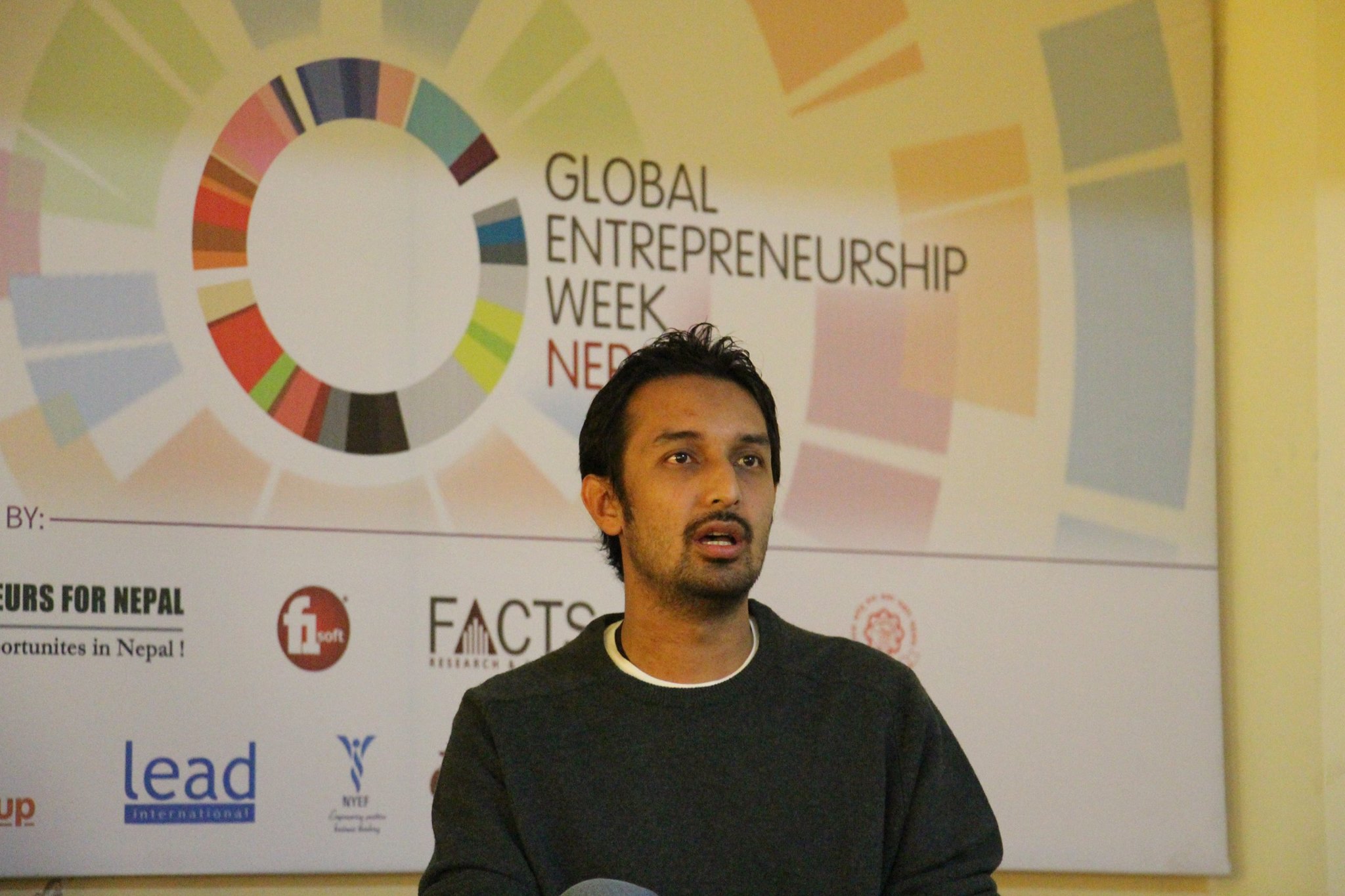
Krisha Bajracharya: After completing undergrad degree from UK, I returned to Nepal and soon joined Himalayan Java as a manager. Soon, I left the job and joined Karuna Natural Wears as store manager. But, again, I left it as I didn’t like these 9-5 jobs. Then, MN Entertainment happened. After MN Entertainment started to grow, and we expanded our PR, we thought we should not get limited to event management only, and wanted to start a restaurant. Then, we opened Durbar Restaurant some six months ago in Durbarmarg. With success of the restaurant, we have recently started Palpasa Hukkah Bar in Basantapur.
Paras Katuwal: My father was a farmer. Seeing my father toiling in the field was very disturbing. Most of the people in Nepal are engaged in agriculture. Later, he left for Israel. There also, he worked in agriculture. He didn’t return to Nepal for 10 long years, as agriculture there was very fun and easy. After returning back, he started agro-farm in Balaju. I used to work on the farm, and the most challenging thing there was irrigating the plants. To solve the problem, we started drip irrigation. After installing the system, irrigation was very easy, and other farmers also started to come our farm and see how we adopted technology in the farm. Then, we started a company to provide irrigation solution. Now, we provide consistent agro-solutions for farmers to improve production and make farming easier. Now, what I am doing is, I’m changing the entire villages. Recently, we have also introduced solar water pumps. We are changing agri-culture to agri-business. We also build low-cost green houses, train the farmers. Literally speaking, we have changed the lifestyle of people. The barren lands have now been turned into green fields and farmers are earning money.
Prakash Basnet: After completing bachelor degree, I started working in a company. Later, I left the job and joined Jyoti Group as Sales and Distribution Manager. While working in the company, I felt like I need to start my own business. So, with 4 co-founders, we started Mr Help to provide various line-sitting services to the people, as we could see queues everywhere. Added to this, e-commerce sites are growing in Nepal, leading to rise in the demand for logistics and delivery services. So, our company started to provide these two main services. We first provided same-day blue-book renewal services to the people, and became delivery-partners to various e-commerce sites. Added to this, we have also started office materials and documents delivery services. Though e-commerce business is rising in Nepal, it will take some more time for them to mature for logistics service providing companies to sustain from delivery services alone. So, we later started Help2Shine, a new service to provide domestic helpers/maids to homes and offices.
Prarthana Saakha: First, I thought of joining United Nations for a job. But, I later found that working there was not that great, though job reputation and salary is very good. I found very strict hierarchy in the organization where one can’t utilize their ideas, skills and expertise at all. As a business student, I felt like that was for me, and became hesitant to join the company. Later, one of my friend lost his helmet after partying whole night in Thamel, and had to return home without riding the bike took bike. We thought that selling helmets might be a good idea. So, we started the business of selling helmets online as a very random idea. We first bought few helmets from our own pocket money, and put it for sale on Facebook. Later, as the sales took up, we created an online platform to sell helmets, gloves and many other bike accessories.
These startups are from the ideas we have ignored the most.
How was it at the beginning, and how did you set the journey to reach this level?
Singh: Though all knew such soft-skills to be very essential, none were interested to pay for it. Students were least bothered about soft-skills, and focused more on academic degree. Then, we tried to convince school management, and they used to find a way for excuses to not to take our services. It was really challenging to convince them. Later, we approached teachers, who would be developing educational packages, as per their interests. In Nepal, we can hardly find people who are interested for their personal development. Then, we approached various companies who experienced that developing various skills in their staffs would benefit the productivity of the organization. Since then, we have been working on that model, and there has been no turning back.
Our families mostly encourage us to be doctors and engineers. And, they are least concerned about starting a business. Had you ever thought you would be doing business? Or, did you want to join other profession?
Katuwal: While studying A-level science, with biology, I saw challenge in agricultural sector in Nepal. And, wanted to change the scenario by inventing different type of seeds that can give massive production. But, I thought I needed 20 years bo bring that into practice. So, I searched for an alternative way to help the farmers. I wanted to be an entrepreneur. I had known about irrigation from my Physics studies, while I gathered knowledge about agriculture from Biology. With symbiosis of these two topics, I planned to start this company. As I was not legally eligible to start a business, at 17 years of age, I convinced my dad to register it. My family totally supported me to start the business.
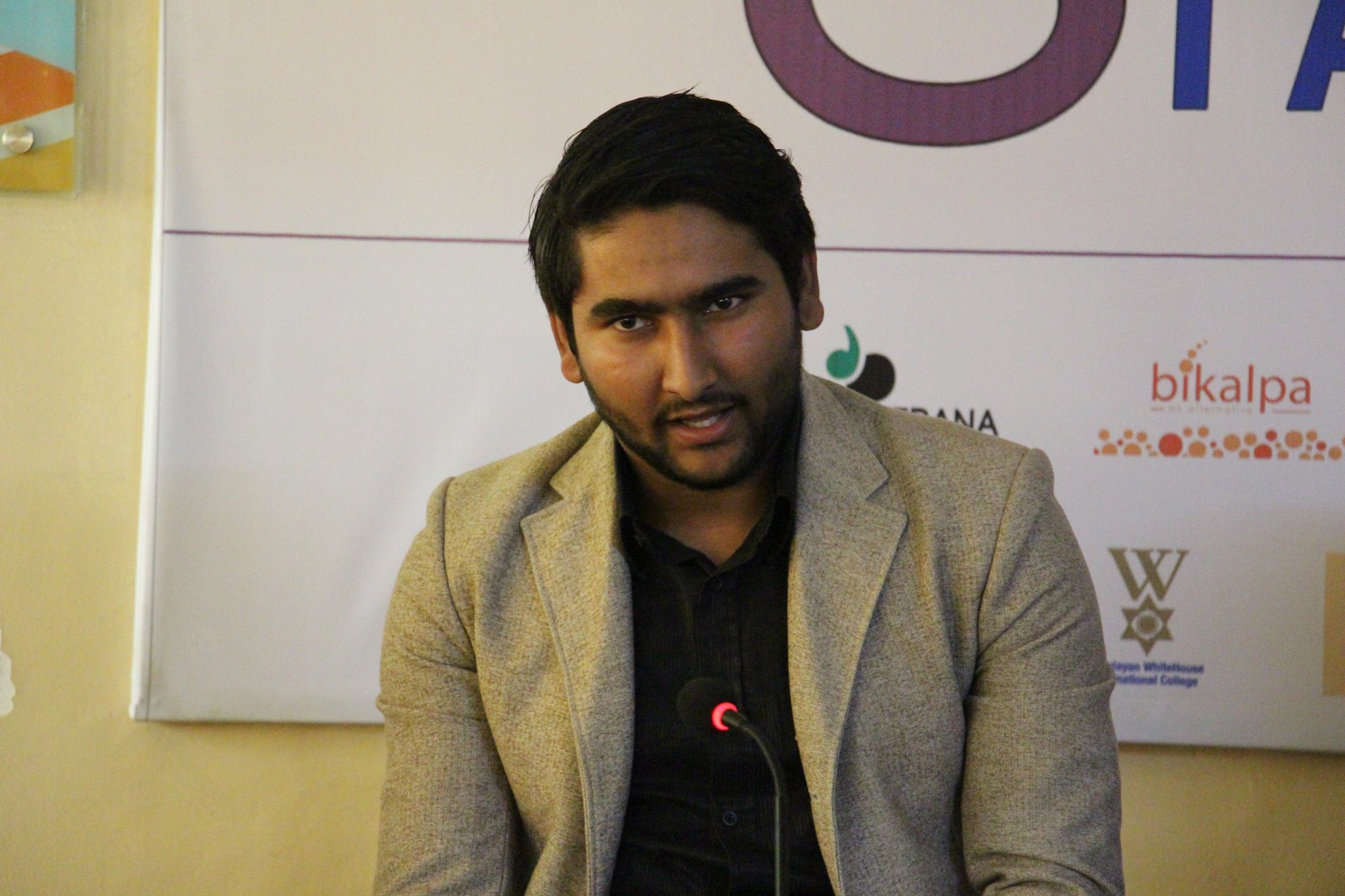
How have you been practicing the team culture in your organization?
Basnet: I came to this business by first leaving my family business. While working in Jyoti Group, there was a senior manager who was serving the company since the last 30 years. Looking at his situation, working in similar post since the beginning, with very less amount of salary and walking on foot all the way to work, I thought I couldn’t work in that organization. In big companies, one has to work as per the order of his manager. In my dream company, which I am currently leading, every team member gets more freedom on their way of working.
Singh: At our organization, we have set the motto “Education is cool”, making youngsters comfortable to work in the company. After one joins Edushala, we explain them about our business model, and goal. Then, they are given freedom to work on their own. This has brought more creativity in the organization.
Most of the people want to join IT or other similar organizations. How is it working in your organization? How interested are they to join the sector you are leading?
Katuwal: It’s difficult find people interested to work in agricultural sector, as we don’t work from air conditioned offices. Youths feel odd to work on such environment. It’s hard to make a workable team. Most people who worked with me have left for greener pastures abroad. But, within this short time-frame, Nepal Thopa Sinchai has grown to be a One Million Dollar Business. (A huge round of applause follows from the audience.)
For girls, it’s hard to start their own business. They need to return home on time. Family forbids them from going to events, and doesn’t want them to go to office on Saturdays. You (Bajracharya) have been working in the business that is restricted for girls i.e. event management and restaurants, and Prarthana is working on helmets and bikes, a sector solely for boys, as per our social norms. How challenging is it?
Bajracharya: I left all the freedom in UK itself, and came to Nepal with a different concept in my mind. While organizing parties, it’s somehow challenging. But, my family becomes happy as I share them about the profit I was able to make on that day. As the team work is good, it’s going smoothly. Last night itself, I was working till 3:30 AM. Though coming from such a conservative family, I have to work. If you can convince your family, it’s not that challenging.
Saakha: If a boy asks his parents for permission to start a business, they’ll feel happy to support him. But, for girls, it’s literally non-existent. They don’t want her to start a commpany. And, in the business, customers hesitate to trust girls. One day, I was explaining about the feaures of a helmet, and the customer didn’t listen me. Instead, he asked about the helmet to the delivery-boy, who literally didn’t know anything about the helmet. So, it’s challenging for girls to come forward. But, the situation is changing.
Bajracharya: Plus, it’s more challenging for girls to seek funds from family. It’s really hard to convince your parents to ask for money to start a business.

Are people willing to work in your organization? Most of the students want to do interns in corporates and big organizations. How is the situation?
Basnet: It’s true that most of the youngsters want to work in IT companies and corporate houses. But, in our company, they are not treated as interns, but colleagues. Everything is going online these days, and shopping is not an exception. The e-commerce industry is sure to boom very soon. So, we welcome those willing to join our team with assurance that working with us will be a different experience.
What is it that lacks in traditional businesses? And, what does it need to be changed to suit today’s context?
Katuwal: Startup is a buzzword these days. So, to all those who want to start businesses, I first want to suggest that, before directly jumping into business, you need to work rigorously in other companies and gather some experience so that you can know about organizational cultures. You also need to be disciplined, maintain some hierarchy, and feel the urgency.
Bajracharya: We also need to be flexible for employees to leave the organization for better opportunities. You need to learn to let them go. At Durbar, almost none of the staffs from the founding days are with us now, but it’s going well.
Basnet: Startup is all about change, and facing challenges. It’s a continuous process. If you can show a cause, people are happy to work even for a low pay. At Help2Shine, we have been working on a major issue of professionalizing domestic workers. They are ready to work on minimum and basic salary.
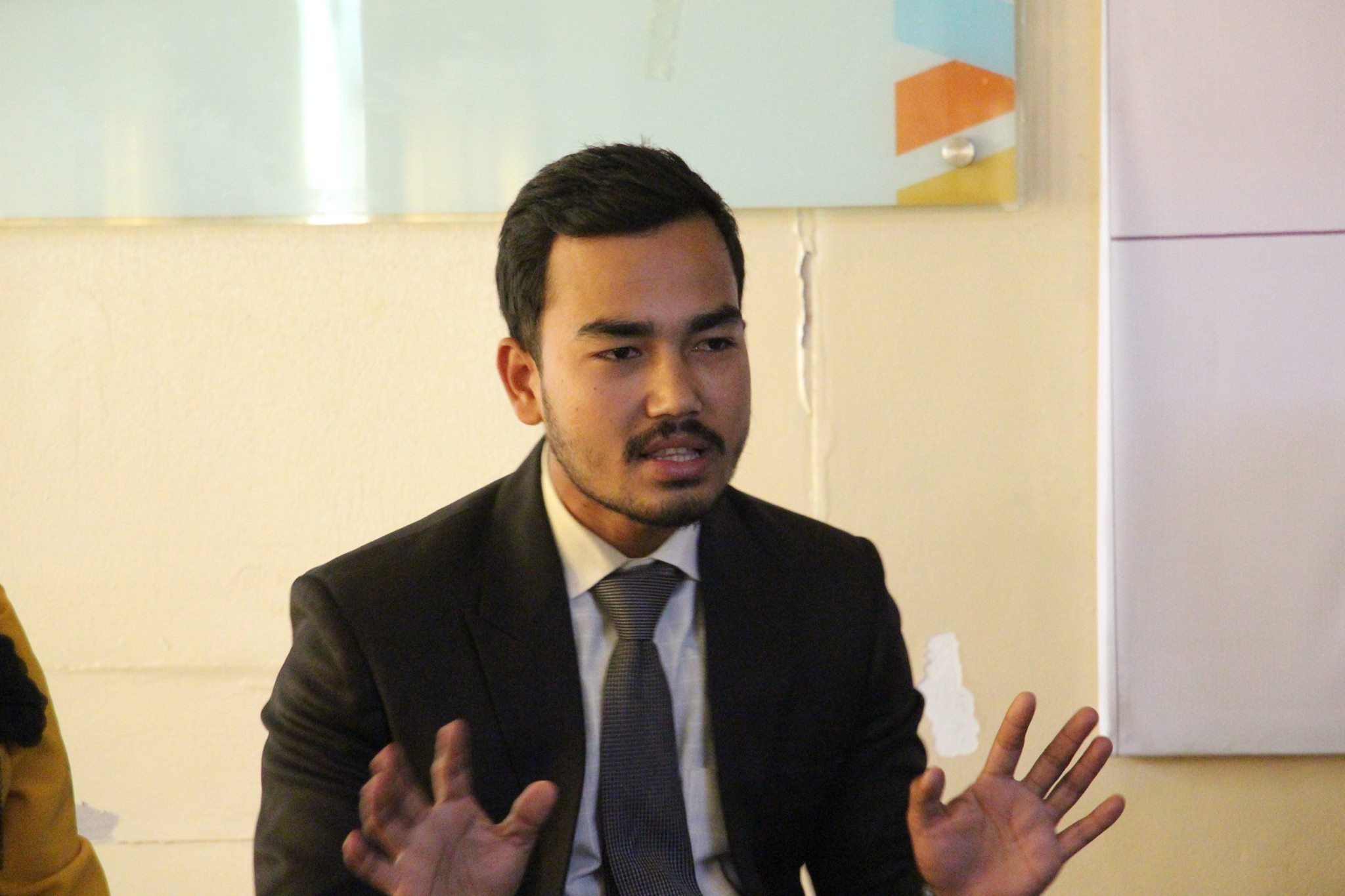
Katuwal: It’s silly ideas that bring changes. You will surely be criticized at first. In the beginning, people didn’t trust my idea, and doubted if the agro-technologies work and give better result.
How did you seek the niche market for helmets?
Saakha: In Nepal, almost every household has a bike or two. And, people are changing helmets every 1-2 years. So, we saw opportunity on selling helmets.
Mark Zukerberg became the present Mark Zukerberg, wearing a normal t-shirt because he keeps so busy in his work that he doesn’t get time to show him as a professional guy in a coat. Binod Chaudhary became Binod Chaudhary only because of a lot of sacrifices. It’s not an easy go.
How is your daily routine like?
Singh: Mine is not that different from others. In the early morning, I plan on what I am doing that day. I teach in a college in the morning. At 9:15, I leave for office. Then, engage myself on office works till 5:00. In the evening, I return home and spend some time with my friends and families. Later, I engage myself on works related to office and college.
Bajracharya: My day starts very late. It’s been long I have not seen mornings. It usually starts at 12:00. Then I go to offices: MN Entertainment, Durbar and Palpasa.
Katuwal: My college starts at 6:45. So, I get up at 6:30 and rush for morning routine, and then move to college. After the classes are over at 9:30, I leave for office. I strictly stay there for 12 hours, 7 days a week, and 365 days a year. As an startup founder, I keep busy in work all the time. I find it hard to manage time for my friends. I feel like Mark Zukerberg became the present Mark Zukerberg, wearing a normal t-shirt because he keeps so busy in his work that he doesn’t get time to show him as a professional guy in a coat. Binod Chaudhary became Binod Chaudhary only because of a lot of sacrifices. It’s not an easy go.
Basnet: As my college starts at 6:30, I get up at 5:00. After the college is over, I head straight to office, and keep busy till it’s 7-8 in the evening, and sometimes even till 10 PM. Then only I set for home.
Saakha: My college runs from 6:30-11:00. Then I move to office and work till it’s 6, and then move to home. After completing some household responsibilities, I am back to my study and office works from 10 PM. It’s just like that.

Besides all these, what’s that one thing that you drives you to work out?
Singh: In Nepal, business ecosystem is still not that competitive, though many young guys are coming up with brilliant ideas to work in the same sector. Instead of competing with them, I feel more like collaborating and partnering with them, for mutual growth. Plus, support from the family and my passion towards the work and eagerness to achieve something is what is driving me to this position.
Bajracharya: We have a very good team spirit at the organization, and there’s mutual cooperation in our team. I don’t hesitate to do any kind of work, eg. selling door tickets and almost anything one needs to work while organizing events. For me, it’s my family, my team and the vision of the business that drives me towards the work I am doing now.
Katuwal: There are no youths in Nepal who are interested in agriculture. My main target is to increase the level of national income. To a farmer who is growing 10 kilos of tomatoes, if he’s able to grow 15 kilos with my support, I find a point to feel pride in my work. Till now, I’ve helped more than 15 thousand farmers with agro-tech. My target is to bring a revolution in agriculture. Their difficulties gives me the power to do more.
Basnet: Most of the families don’t want their children to do business. And, it’s extremely rare scenario when a family supports them with investments to start the business. As I’ve experienced, it’s always better to start business in partnership instead of doing it all alone as you get better support from your partners. You can’t share about the difficulties and challenges in the business to your family. It’s partners who can support you in such situations. But, you should be conscious while choosing partners. It’s a rare case for best (close) friends becoming business partners, as you need people from different backgrounds with different talents to run a company.
Saakha: If you planning to start something, student age is the best time to kick it off, as you can easily get supports from your teachers and mentors.
After the formal panel discussion with the moderator was over, audiences participating in the programme got a chance to quench their thirst of getting more ideas from these startup founders. The first question was on how to start a business with zero investment or getting easy investment into business. Below are the answers from the panelists:
Saakha: We turned our pocket money into investment while starting helmets Nepal, and didn’t ask for money from friends or family. In every business, you need to think about generating maximum profits from minimum investment.
Singh: If you have an idea that works, you can easily look out for investors. Or, you can simply convince your family and relatives on your business idea and seek for their help. There are also many angel invstors out there who invest in ideas that work.
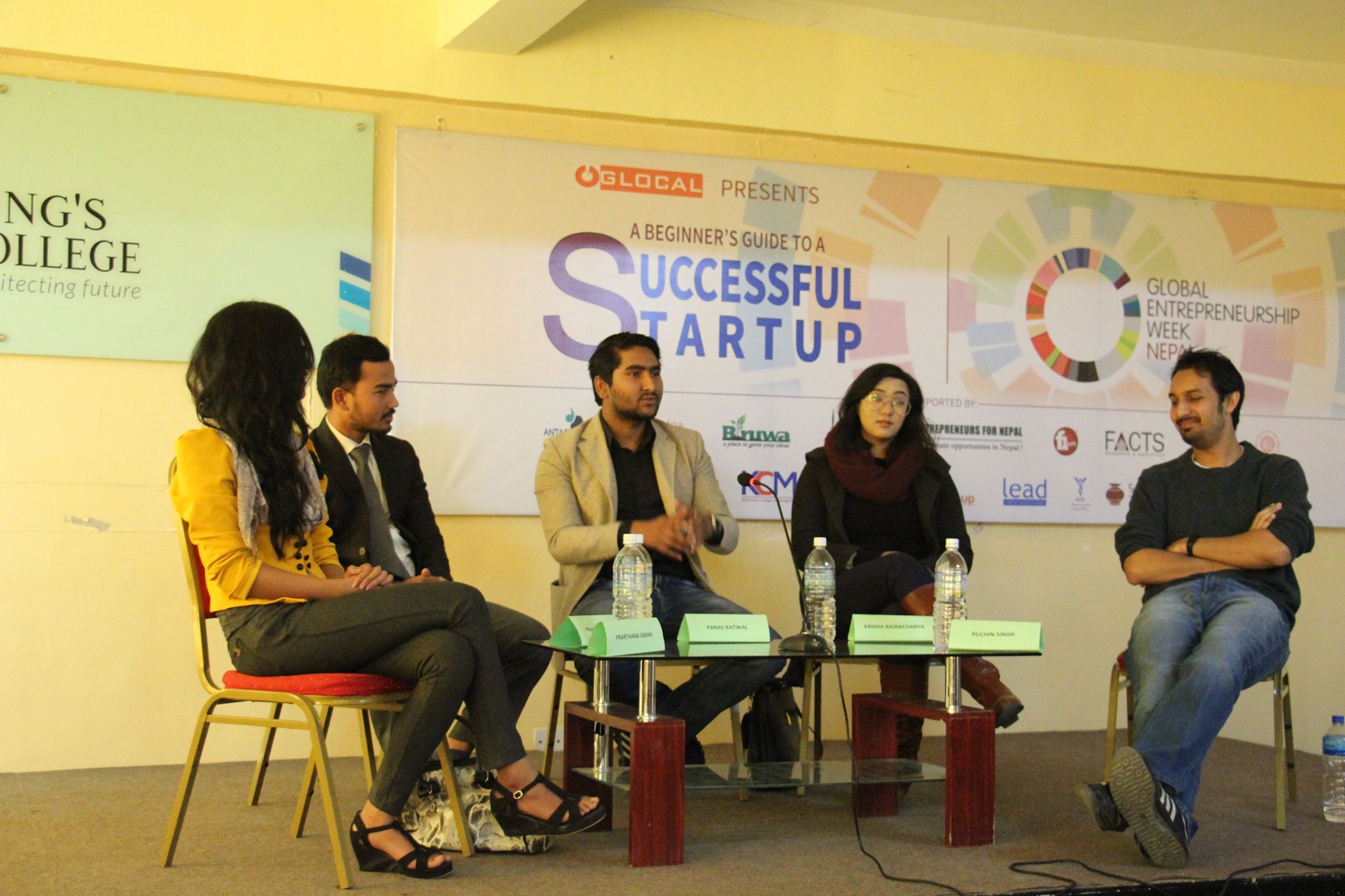
The panelists also shared the stories of their failure into the business and lessons learned in the process:
Singh: Edushala founders were from a variety of skillsets. As time passed, their priorities changed. Within 2 years of starting the company, everyone left. It had even reached such a situation that there were just 4 members in the company, 2 co-founders and 2 interns. I had made a thought that if I can’t handle the situation, I’ll close the company and do something else. But, we bounced back very soon and it’s running smoothly since then. I’m sure it won’t reach that fate ever again.
Bajracharya: When MN was first started, it was very challenging. It was real hard to get sponsors for the events, and reach the targets. But, things are going very good now.
Katuwal: There are many of them. First of everything, farmers were not trusting me and my idea. Despite that, I was slowly moving ahead. Sometimes, situations became such terrible that I used to be stressed out. Though mine is a million dollar company, I have faced times when cheques of 7 thousand rupees have bounced. I used to be worried about it. But, I have developed immunities to face such situations. One day, I got a call from bank saying there is a deadline for a loan, needing me to pay it back within two hours, and if that was not settled that day itself, I were going to be black-listed. Within a moment of getting the call, I got another call from Department of Customs mentioning that my goods have arrived and I needed to make a payment of 2.5 lakhs, and if it was not going to be settled that day itself, they would be seizing the goods. I couldn’t think of anything that time and lost hope as I had only 7-8 thousands in my bank account, and needed to make payments of 7-8 lakhs. One of my project was ongoing in Ramechhap that time, and at that very moment, I got a message from one of my main staffs saying he needed to leave the company immediately as he had been selected to study abroad in scholarship, and needed to prepare for the same. I felt like closing the company, immediately. But, I managed to pay to bank and customs the next day, and was saved from getting blacklisted.
Basnet: In the beginning, we got complaints from clients for non-performance, as we faced scarcity of skilled laborers to do the jobs. We had started Mr Help with 6 months of business plan. And, if it failed, we were to change it as we had plan ‘B’ while starting the business. We too had made an exit strategy. Over time, we diversified our works/products and everything is running smoothly since then.
Saakha: First, we failed to convert the business knowledge in the books into real life. We found it real hard to register the company, though we had studied Nepali business laws and company registration process. Then, managing HR was very challenging. It didn’t work as per what we had studied in college. We had to do a lot of struggle, and learn in the process to bring the company to this shape. But, things have now fallen into place. I now feel proud for starting and successfully running the company.
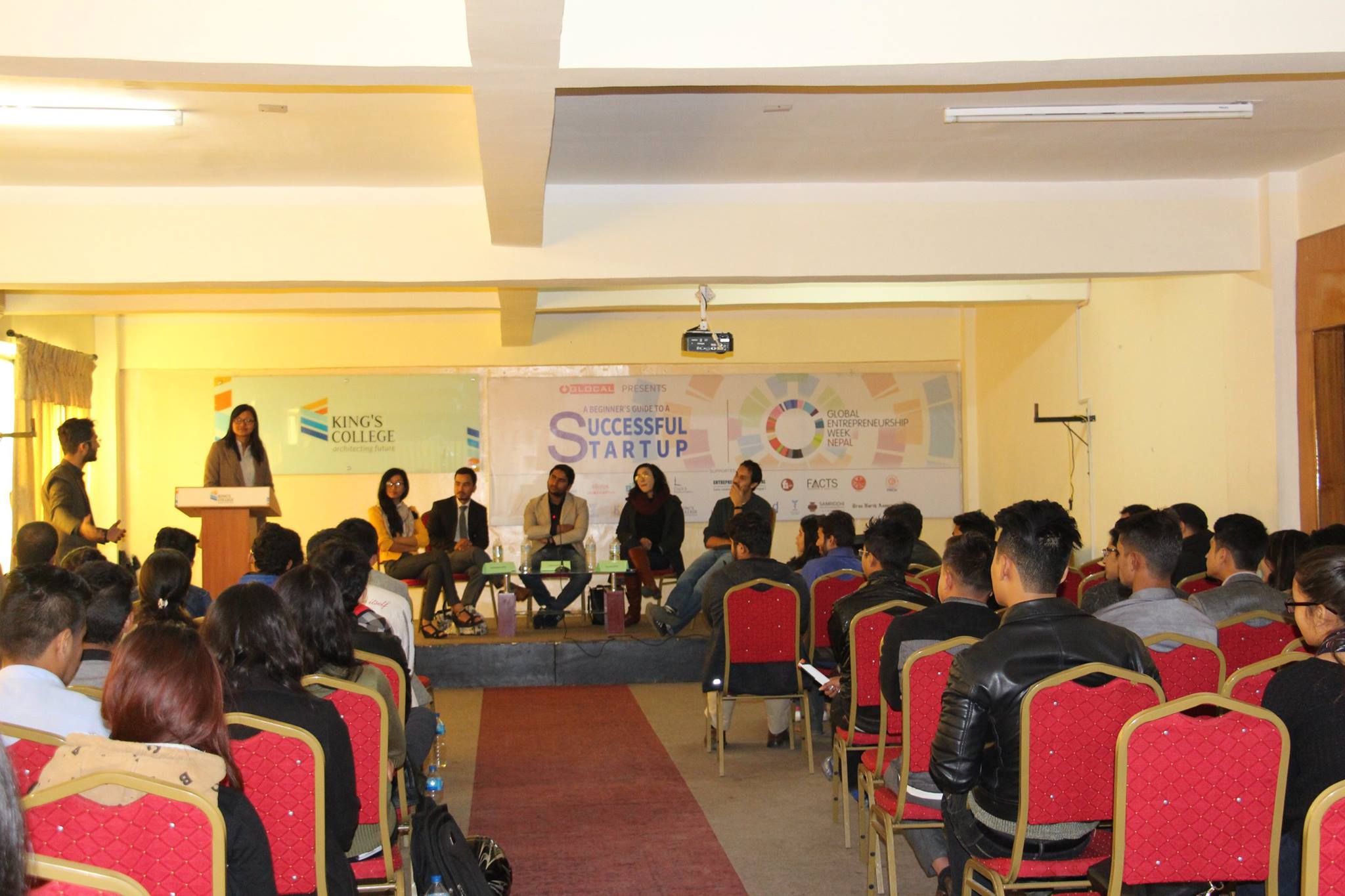
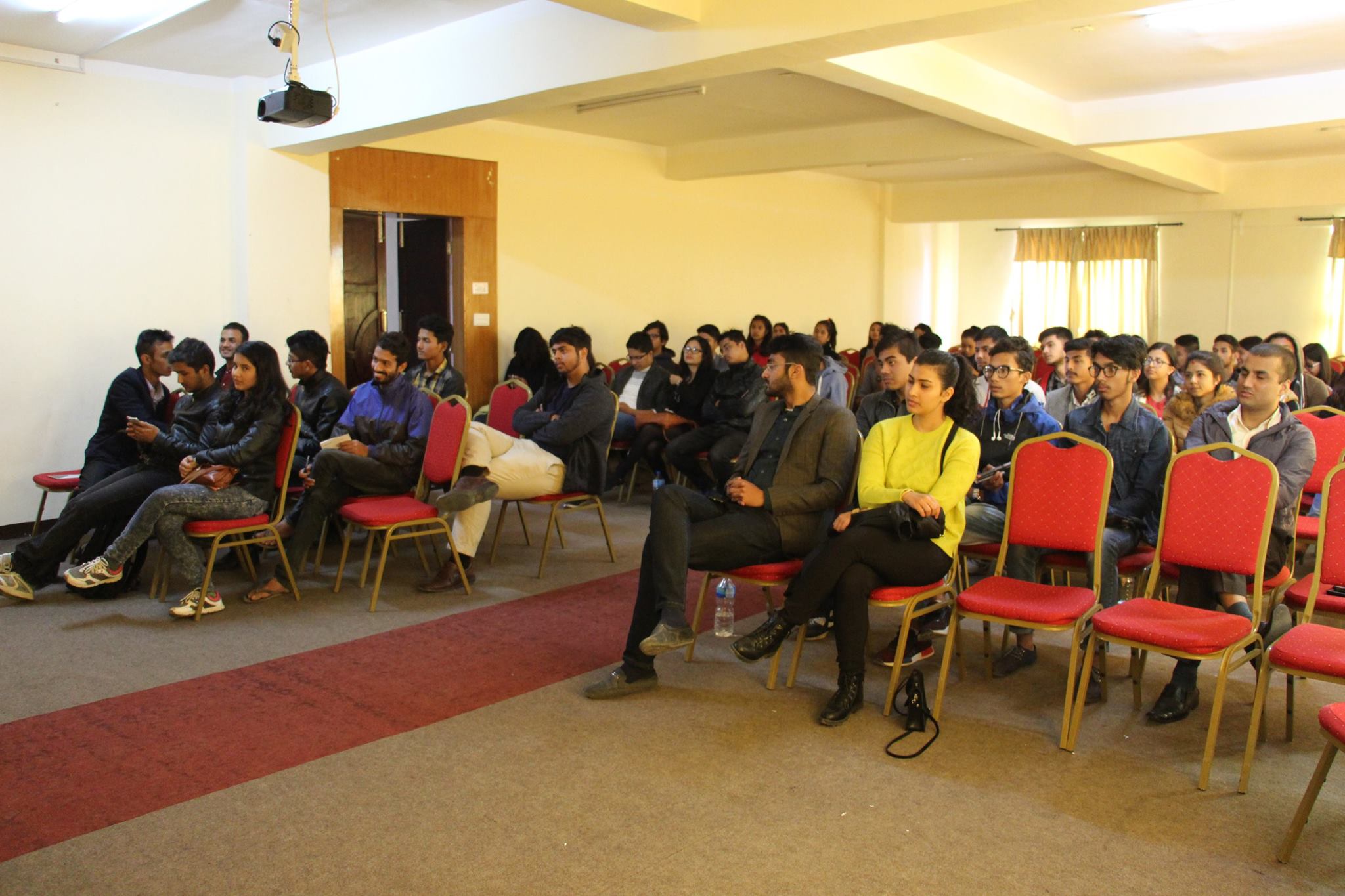
Photographs: Anusha Kadel
By Basanta Kumar Dhakal

